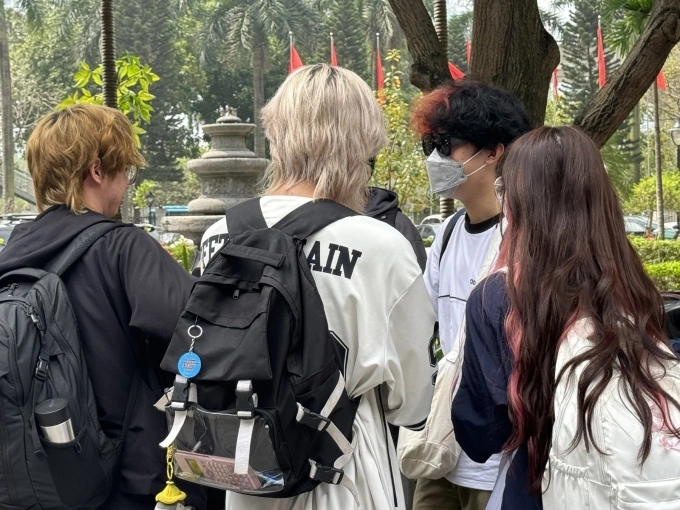Edition: International | Vietnamese
© Copyright 1997 VnExpress.net. All rights reserved.
"At that time, the thought of altering my fashion style just to secure a job never crossed my mind," Cuong, 23, from Hanoi said.
Cuong, a hip-hop enthusiast, embraces a grungy aesthetic, including dyed blonde hair, nose rings, earrings, and arm tattoos. "Ripped jeans are a staple for me, though they often draw criticism for making me look like a delinquent," he shared.
Despite others frequently disapproving of his fashion choices, Cuong remained unfazed until his unique style began to hinder his job search.
Last year, Cuong interviewed for a tech company role, facing a female department head in her 40s.
"Right from the moment she saw me, her demeanor turned unwelcoming, despite me wearing a polo shirt and foregoing my usual ripped jeans," Cuong remembered.
As the interview progressed with several questions and tests, the interviewer warmed up to Cuong after observing his strong performance. Nonetheless, she stipulated that she would only extend an offer if Cuong toned down his hair color and removed his piercings. After contemplating for two days, Cuong ultimately chose to decline the offer.
 |
|
University students in Hanoi engage in conversation on campus, March 23, 2024. Photo by VnExpress/ Pham Nga |
Psychologist Hong Huong from the Children's Rights Protection Association noted that while society is becoming more accepting of young people's fashion and lifestyle choices, generational gaps still present challenges.
"Many young individuals are unfairly labeled as spoiled simply for showcasing their uniqueness through their appearance," Huong remarked.
A VnExpress survey involving nearly 2,000 participants revealed that approximately half of the respondents were hesitant to work alongside individuals with tattoos.
Thanh Nga, now 28, vividly remembers a distressing incident from six years ago during her early teaching career. She was confronted at the school entrance by the vice principal, who sharply criticized her attire, demanding, "How can you teach dressed like that? Go home and change into something else."
Shocked and in tears, Nga felt her pride shattered, unable to reconcile her style with the vice principal's demands. In response, she chose to maintain her self-respect and dignity by resigning from her position.
Nga, a foreign languages student from Hanoi, is known for her distinctive style, including an artistic neck tattoo, colored hair, and a preference for feminine sundresses. After spending two years working in the city, she returned to her hometown to be closer to her family and started her own evening English class.
"I have free mornings, so to build connections, I was advised to find work, leading me to apply to a nearby secondary school," she explained.
However, Nga's presence at the school consistently provoked negative reactions from the vice principal due to her appearance. Despite her efforts to dress conservatively, she was regularly reprimanded for her attire being either too baggy or too vibrant.
"Perhaps his initial harshness towards me was influenced by my tattoo and dyed hair," Nga speculated.
‘Family’ gangster
Le Nhu Quynh, residing in Ho Chi Minh City, found herself at odds with her parents over her tattoos and fashion choices. Marking her coming of age at 18, Quynh Nhu chose a tattoo featuring a sunflower, a sleeping baby, and an infinity sign emblazoned with the word "Family", stretching longer than a finger.
"When my mother saw the tattoo, she kept scolding me, asking me if I was in a gang, and why didn't I remove it? Is it because if I erase it, I'll be killed?" recounted Nhu, a Gen Z individual with educator parents in HCMC.
Driven by frustration, her mother took her to a tattoo removal clinic, only to be taken aback by the high cost. Her father intervened, suggesting, "Let her make her own decision. It's her life, and her job prospects are her concern."
Nhu chose to keep her tattoo.
Nhu has been enhancing her confidence through gym training and working as a fitness trainer in recent years. Her wardrobe evolved to include crop tops and sports bras paired with baggy or sports pants, embodying a sporty-chic aesthetic. However, her choice of attire drew caution from her mother, who expressed concern that such revealing clothes could tarnish her reputation.
Beyond familial worries, Nhu faced skepticism from others about her tattoo, with some directly accusing her of aspiring to a gangster image. Echoing her father's caution, she encountered warnings that her appearance might limit her employment prospects.
Despite these challenges, Nhu continues to express her identity proudly, as seen in a photo of her wearing an off-shoulder dress that showcases a modest arm tattoo, a testament to her self-assurance and personal style.
 |
|
Quynh Nhu in an off-shoulder dress highlights a petite tattoo on her arm. Photo courtesy of Nhu |
Expert Hong Huong notes that while appearance may reflect a person’s personality, style, or emotions, it does not provide a full measure of their character. "Social norms evolve, much like water flowing in a stream. We can't apply one generation's standards to another," she explains.
Psychologist Dao Le Tam An, a PhD student in Psychology at Ho Chi Minh City University of Education, discusses the tendency to label young individuals who dye their hair, get tattoos, or piercings as greedy and spoiled. He suggests this is a mental shortcut to save energy, favoring conformity to societal norms and causing surprise or annoyance towards those who deviate.
This mindset is often amplified by media portrayals of rebellious youth, reinforcing stereotypes and overlooking the diversity and complexity of individual identity.
An argues that such simplistic thinking fosters prejudice, restraint, and unfairness. Especially for young individuals nearing adulthood, being subjected to labels can cause them to perceive their family environment as unsupportive and alien, thereby exacerbating the generational divide.
An cautions: "This kind of restriction can provoke rebellious actions that may escalate to risky behaviors.
Problematic problems
According to Hong Huong, workplace judgment, as experienced by individuals like Cuong or Nga, can damage young people's self-esteem and hinder their ability to acclimate to new settings. "Judging others by their appearance not only deprives you of the chance to truly understand them but also of potentially valuable relationships with friends, colleagues, or employees," she notes.
Dr. Pham Thi Thuy, a sociologist at the National Academy of Public Administration in Ho Chi Minh City branch, emphasizes the significant role young people play in shaping the future of society. She argues that older generations should neither impose their standards on the youth nor will such attempts be successful in the long run.
Initially committed to his grungy fashion, Cuong faced workplace discrimination, prompting a temporary change. He concealed his piercings for interviews and the initial phase of his employment.
Over time, as he established rapport and demonstrated his skills, Cuong gradually reintroduced his personal style, starting with dyeing his hair and eventually wearing his earrings and nose ring again. "A few weeks into the job, I started to show my true style again. Now, everyone has accepted me for who I am," he shared.
Nga, after leaving a job due to criticism over her appearance, recognized that the problem wasn't her or her clothes, but a mismatch with the vice principal's conservative views. She sought an environment that valued her freedom and individuality, leading her to relocate to Singapore, where she enjoys a judgment-free life and work.
Quynh continues to embrace her tattoos and unique style despite being labeled as "spoiled." She found employment in a modern, accepting workplace where her tattoos, piercings, and dyed hair are not only accepted but shared among colleagues and superiors, underscoring a broader acceptance of individual expression.